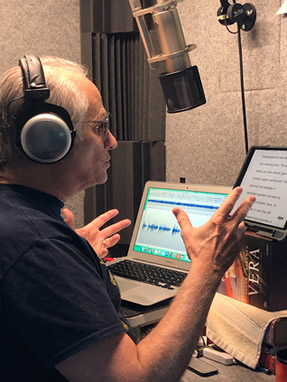
Voice acting, like any form of acting, is a form of storytelling. And as with all acting training, the actor takes the craft of storytelling and breaks it all apart. You study each element of the craft (performance, tech, business), you see what you range you have, and what your strengths are, and you run up against obstacles that you either master or work around. You find your limits. You define your brand. You refocus.
Ultimately you want everything about how you tell the story to be a conscious choice. Acting is like driving: it’s best done awake. You’re more likely to arrive home that way.
You may get the feeling during your time at The Voice Actors Studio that we examine how you tell stories so much, you might feel like you’re losing track of how to tell stories!
Perfect!
If you’re having that feeling, then you are truly engaged in the study of acting. When you get through the process, with your storytelling skills strengthened and reassembled, you can launch into a confident career.
This career includes:
- You have broken down the script and know the full array emotions, attitudes, and feelings evoked by the copy.
- You are moving that analysis from your head to your heart and mouth, and are firing up a real emotional response to the copy.
- You know who your audience is and that they want to hear a good story.
- You know that to your audience, you’re a character, even if it’s “just you.”
- You know why you are speaking, and
- You know WHO YOU ARE and what you believe—not “I’m the guy or I’m the mid 30s woman”— but “I’m Joe/Clara. This is my peanut butter jar and I’ve used Spiffy Peanut Butter to raise my kids and they’re all successful geniuses. And Spiffy is the best peanut butter on this planet. Period.”
- You have a unique attitude that we can hear, based on what’s in the copy and the experience this person/character/narrator has had in the world of the script.
- You know you aren’t PLAYING a character–you ARE that character because they just cast YOU to be the character.
- You will give us YOUR TRUTH, your reaction to the product, the situation, the story that’s unfolding, in the world as defined by the text.

Jack at work in the booth.
Actors never stop studying. Watch and listen to people everywhere—on the street, in the media. Pay attention to how people react, behave, and speak. Capture that somehow, through written notes or recording some copy while in the mindset of the person you just observed.
Listen for interesting voices that you run across. Imitate them when you get home or record them on your phone and save that audio. Name the file for the character archetype or the emotion that voice conveys to you.
When you’re not doing all this, then you’re taking a class to exercise your skills and keep them limber. And then, after some time, you repeat this whole process because you’ve changed, you’ve grown, you’ve become a new actor with a new set of skills.
Grow. Learn. Act. Audition. Perform. Repeat.